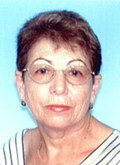Miriam Goldin
 I was born in 1939 to Frieda and Feivush Griner in Vilna, Poland. My grandmother owned a grocery store. My grandfather and my father worked in a fur factory and my mother was a nurse.
I was born in 1939 to Frieda and Feivush Griner in Vilna, Poland. My grandmother owned a grocery store. My grandfather and my father worked in a fur factory and my mother was a nurse.
On 1st September 1939 the Germans invaded Poland. I was born five months before war broke out. The Jews were crowded into the Vilna ghetto. My father worked taking care of animals outside the ghetto. On 30th March 1944 an Aktion was carried out against children, and my parents looked for a way to hide me. My father took me to a garage and hid me under a tarpaulin together with 13 other children. These children were discovered and murdered. My memories start from age four upwards, and added to them are stories I heard from family members. I was saved thanks to my courageous father’s presence of mind, and fate. As no children were left in the Vilna ghetto it was crucial to find an adequate solution to keep me hidden.
My mother managed to send a note to a Polish family informing them that I had been rescued and asking them to find a hiding place for me. The question was how they would transfer me out of the ghetto without being discovered.
My grandfather who worked with animals outside the ghetto walls came up with an idea to hide me in one of the large pots in which they prepared fodder for the animals. The only problem was that the Germans would check the pots every now and again, which would pose a danger that I would be discovered. I was smuggled out in a pot, and not in a sack because I refused to be put into a sack.
One evening it was decided to go ahead with the escape. Thanks to a stranger I was handed over to a family who was waiting for me, as planned in advance. My grandmother told me that she saw me walking hand in hand with the Polish woman along the river bank.
The Polish family hid me in a shed where I remained in perfect silence. Even as a child I realized the importance of staying quiet. I forgot my Yiddish and spoke only Polish. I was also baptized in a church, I prayed and crossed myself as a Christian in every way. Pesia, my name from back home, was changed at the baptism and I was named Marisa. I have kept this name as it meant more to me.
The Polish family had a kind-of maid who was Jewish, but I do not know what happened to her. The Jewish girl saved me when the Russian front was approaching, all the Poles ran away and I stayed with her. This Jewish girl took a kayak and we sailed over to the forests where we hid. She returned to the city and was never seen again.
In 1945 when the Red Army liberated the area, my parents escaped from the work camp where they had been taken. My father was a strong man and the Germans used him to the full. At the Polish woman’s house my parents found a five year-old child speaking fluent Polish, not remembering any Yiddish at all, and praying devoutly as a Christian.
At first I refused to accompany them, but gradually, after a number of visits, I came back to them. We returned to our house in Vilna but the house was occupied by Poles. They let us live in one room with other survivors: my mother’s brother Yitzchak Flexer, my mother’s uncle Chaim Glaser, and my grandfather’s niece who had lost her husband and two children in the war. Following a court order, the house was restored to our family. My sister was born in 1951.
In 1959 I married Mark Goldin in Vilna, and we emigrated to Israel in 1972 with our two children: Baruch – an electrician, and Bella – who lives in Canada. We have been blessed with grandchildren: Netta, Eden, Niv and Uri.
My testimonial is recorded in Steven Spielberg’s Holocaust Remembrance Foundation.
Source: Hod Hasharon

